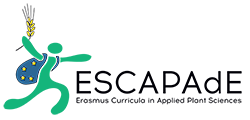English title:
Laboratory course agricultural genetics
Course ID:
940110
ECTS credits:
3,0
Title in native language:
Laborübungen Genetik für Agrarwissenschaften
Laborübungen Genetik für Agrarwissenschaften
Term Semester:
Autumn/Winter
Instruction language(s):
German
Course content:
Based on topics of the same titled lecture, the experimental course “genetics for AW” deals with examples of classical microbial genetics (crossing experiment) and examples of plant and animal genetics. Naturally occurring or controlled gene transfer in the laboratory (plant genetics) is shown. Molecular genotyping by means of characterization of molecular markers is done (animal genetics).
Detailed description of the carried out experiments:
1. "classical genetics" (crossing experiment with fungi):
In this example, Aspergillus nidulans is presented as an excellent genetic model organism. Various strains with different characterized phenotypes are crossed and the progeny is analyzed.
2. Detection of controlled gene transfer in the laboratory:
First DNA is extracted from potentially genetically modified raw materials (for example, seeds, food- and feedstuffs) and analyzed for genetic modification by means of molecular biological methods (PCR).
3. Detection of natural gene transfer:
Soil bacteria are used as a natural transformation system to transform fungi with appropriate selection markers (antibiotic resistance). The transformation efficiency is determined and the transformants are analyzed by molecular biology.
4. Genotypic characterization (animal genetics): genotyping of bull sperm by characterization of the “kappa casein gene”.
Detailed description of the carried out experiments:
1. "classical genetics" (crossing experiment with fungi):
In this example, Aspergillus nidulans is presented as an excellent genetic model organism. Various strains with different characterized phenotypes are crossed and the progeny is analyzed.
2. Detection of controlled gene transfer in the laboratory:
First DNA is extracted from potentially genetically modified raw materials (for example, seeds, food- and feedstuffs) and analyzed for genetic modification by means of molecular biological methods (PCR).
3. Detection of natural gene transfer:
Soil bacteria are used as a natural transformation system to transform fungi with appropriate selection markers (antibiotic resistance). The transformation efficiency is determined and the transformants are analyzed by molecular biology.
4. Genotypic characterization (animal genetics): genotyping of bull sperm by characterization of the “kappa casein gene”.
Learning outcomes:
The students have an insight into the theoretical background and methodologies of classical and molecular genetic analysis.
Students know basic classical and molecular genetic techniques such as extraction of genomic DNA, generation of GMOs, DNA-restriction analysis and the practical execution of PCR.
From the first part they are familiar with the principles of classical genetics and are able to plan, carry out and interpret crossing experiments in the laboratory. They understand the principles of meiosis and can clearly differentiate between segregation and recombination.
From the second part they are familiar with DNA-based methods for the detection of genetically modified organisms, seeds, feeds, and foodstuffs and they are able to assess the limits of detection of GMO materials by conventional PCR.
From the third part they understand the possibilities and requirements for naturally occurring gene transfer and from the laboratory experiments the students can calculate probabilities of such events and they can apply these techniques for laboratory purpose.
From part 4 they are familiar with the analysis of molecular markers for genotyping experiments of practical relevance.
Students know basic classical and molecular genetic techniques such as extraction of genomic DNA, generation of GMOs, DNA-restriction analysis and the practical execution of PCR.
From the first part they are familiar with the principles of classical genetics and are able to plan, carry out and interpret crossing experiments in the laboratory. They understand the principles of meiosis and can clearly differentiate between segregation and recombination.
From the second part they are familiar with DNA-based methods for the detection of genetically modified organisms, seeds, feeds, and foodstuffs and they are able to assess the limits of detection of GMO materials by conventional PCR.
From the third part they understand the possibilities and requirements for naturally occurring gene transfer and from the laboratory experiments the students can calculate probabilities of such events and they can apply these techniques for laboratory purpose.
From part 4 they are familiar with the analysis of molecular markers for genotyping experiments of practical relevance.
Exam method:
Writing and submitting a protocol. Active participation in the course
Organisation: University of Natural Resources and Life Sciences Vienna
Country:
Austria
Acronym:
BOKU
ERASMUS+ code:
A WIEN03
Teaching period summer semester:
22. Feb 2021 - 30. Sep 2021
Teaching period winter semester:
13. Oct 2020 - 21. Feb 2021
University website:
